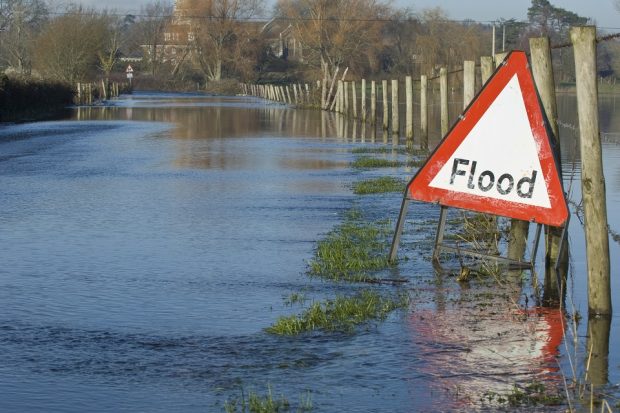
Today there has been widespread positive coverage of the Government’s announcement to invest £860 million in 1,000 flood defence schemes this year, with the majority of outlets leading on the role that climate change has to play in the increased threat from flooding.
It is all part of the Flood and Coastal Erosion Investment Plan, which sets out how new flood and coastal schemes will better protect 336,000 properties by 2027, helping to avoid £32 billion in wider economic damages and reducing the national flood risk by up to 11 per cent.
An article on the front page of the Daily Telegraph draws on comments by Environment Secretary George Eustice on the link between global warming and flooding in an op-ed for today’s the paper. As well as covering the £860 million in 1,000 flood defence schemes this year, the article highlights the improvements to flood insurance to encourage the installation of flood doors, air brick covers and flood-resistant plasterboard in homes previously damaged by water, and the forthcoming consultation this autumn.
Elsewhere, writing in the Express, Emma Howard Boyd highlighted not only the record investment, but also the importance of signing up to flood warnings as we adapt to the changing climate. The Guardian highlights the government’s plans to invest record funding for flood defences in England while The Yorkshire Post takes a similar position noting the £146m investment to bolster Yorkshire's flood defences. The Evening Standard focuses its coverage on the new investment in flood prevention schemes across the UK over the next year, which the piece notes, comes as heavy downpours battered the country. Environment Agency Chief Executive Sir James Bevan was also interviewed on BBC Radio 4’s Today programme about the announcement.
More than £860 million will be spent in 2021-22 boosting design and construction of more than 1,000 schemes across England as part of the Environment Agency’s annual capital programme, with thousands more homes and businesses to be better protected from flooding and coastal erosion, as part of plans published today by the Government outlining a record £5.2 billion of investment over the next six years.
Environment Secretary George Eustice said:
The tragic recent events in Germany and Belgium serve as a sobering reminder of how devastating flooding can be.
We are standing by communities and will bolster defences against flooding across England with many thousands more properties better protected by 2027.
It’s important we take action right across the system. Our comprehensive plan will achieve this by tightening planning procedures, helping more people access insurance and making homes more resilient to the effects of flooding.
Emma Howard Boyd, Chair of the Environment Agency, said:
We have seen some devastating flooding around the world so far this summer. No one can prevent all flooding and climate change means the risk is increasing, but we can reduce the risks.
Having completed the government’s previous six year capital programme on time and on budget, better protecting more than 314,000 homes from flooding and coastal erosion, this year we began the government’s new £5.2 billion flood programme.
These schemes should provide reassurance to communities and businesses, but no one should have a false sense of security. I strongly urge people to sign up for flood warnings and regularly check flood risk on GOV.UK.
The funding will be accompanied by a consultation in the autumn, where the Government will look at how to better protect frequently flooded communities, following a call for evidence earlier this year. It will consider how to strengthen the assessment of local circumstances, such as where areas have flooded on multiple occasions, when allocating funding during the six-year plan.
New guidance for local planning authorities, designed to drive up compliance with planning rules, will reaffirm that they must refer planning decisions to Ministers when the Environment Agency is sustaining an objection on flood risk. Under the plans, the Government will also consider how planning decisions in areas at risk from surface water flooding could be subject to the equivalent rules in future.
2 comments
Comment by John W. Baxter posted on
I would have thought it long overdue that the water companies and thus their shareholders would be pressed by good governments to make large contributions as beneficiaries to the creation of and enhancement of water retention structures to mitigate water shortages in hot summers and flooding in the latter parts of the year. This would give water companies a stake in the communities that support them.
Comment by Lucy Rodriguez-Laranjo posted on
No mention of how flooding is related to poor land management, and the cost-effectiveness of tree planting, which also feeds into other targets. Where is the joined up thinking?!!